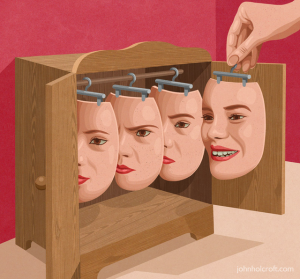7 strengths of Kamishina
Tình cờ đọc được email của một bạn người Nhật công tác ở HQ Septeni Japan, mình thấy khá thú vị nên đã xin phép tác giả dịch ra để chia sẻ ở đây. Cũng không hiểu sao dịch được nửa chừng mình mới nhận ra mình đang dịch ra tiếng Anh chứ không phải tiếng Việt, vì tiếc công phần đã làm nên quyết định theo lao, so please bear with me 🙂
7 strengths of Kamishina: Love/Power to make decision/ Power to carry on/ Mental scaffold/ Bird view/ Enthusiasm/ Power to get people involved
Dear colleagues,
My name is Kamishina, from Septeni Japan Creative dept.
The 4th quarter Women Innovative Leaders (WIL) class is starting from May, and this year is the 3rd year we conduct the [7 strengths email relay].
I myself joint this WIL class from the very beginning, back then we 4 women managers cried and laughed together, and [7 strengths email relay] was one of the outcome of that class.
From then onward, I’ve been participating in the class as an observer, and the spirit of class students and the quality of the class’s assignments had always amazed me. Thus, besides the class, we continued [7 strengths email relay] to encourage WLI students to consciously demonstrate their leadership in their daily works. Please support us and read the relay emails
To get started, let me share one of my [7 strengths] experience
━-━-━-━-━-━-━-━-━-━-━-━-━
■Selected strength: Mental scaffold
Recently I came across this article: [When you’re happy, the world is happy]
http://careersupli.jp/career/kigen/ (Japanese)
Below are some of my favourite phrases from this article:
- A sense of insecurity drive us to the future, but a sense of bad mood will destroy the future
- Bad mood spreads easily, so as good mood
- To influence people by showing bad mood is child-like, to motivate people while showing good mood is mature

Actually, as for myself, I’m taking below things seriously at the workplace:
・ Enable an easy-to-consult atmosphere
・ No negative statement
・ Stay calm and soft
To me the above describes one Mental scaffold of mine. Evidently these resonated well with [do not let yourself into bad mood, don’t let it looks like you’re in a bad mood] kind of phrase, and that’s how the article caught my eyes.
Nevertheless, in the past I used to ran into tempers and had working incidents with my peers and even with my supervisors. Drawing from these experiences, I’ve decided to change myself. In particular I’ve chosen to thoroughly adhere to this new way of thinking: “It’s not the others’ responsibility, it’s my responsibility “. Since then I’ve been keen on building a habit to think like this: Regarding this displeased matter, I didn’t try to fix it even I could do something about it, did I?
From
■The others’ responsibility:
Because 〇〇 san did not do anything, I became this busy !
To
■My responsibility:
Isn’t that because my information was too vague, nothing could be proceeded?
Let’s delegate some tasks to create spare time, then talk to 〇〇san !
To continuously carry on the displeasure feelings is actually hard. I changed my mindset and I could relaxed myself more and took more appropriate actions as the result.
If someone often mindlessly goes into bad mood, please give this a try.


